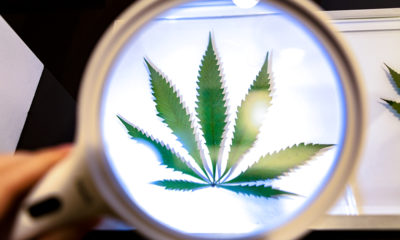
Medical
Topicals: The Real Gateway Drug for Senior Citizens
More and more seniors are coming to cannabis for the first time via topicals, perhaps most often to treat arthritis.
Cannabis topicals are having a moment. From A-list celebrities using Lord Jones balms to soothe aching feet at the Golden Globes to professional athletes debuting their own line of muscle rub, transdermal products infused with cannabinoids seem to be everywhere.
But it isn’t just millennials and the Hollywood elite jumping on the bandwagon. An increasing number of senior citizens are also turning to topicals, often desperate to alleviate a painful and often debilitating condition that affects nearly 54 million American adults: arthritis.
The disease, which causes aches, swelling and stiffness in the joints and muscles, is typically treated with a combination of medications including steroids and opiates, which may have dramatic side effects. However, cannabis is becoming a popular and viable alternative. Infused creams and lotions work when the products’ cannabinoids bind to the network of cannabinoid receptors called CB2 receptors on the skin, without needing to enter the bloodstream. This means people using topicals infused with psychoactive cannabinoids such as THC will not feel a cerebral effect — only localized relief. Transdermal patches, however, do allow the cannabinoids to enter the bloodstream and travel to receptors in the brain, but because the release is so slow, it’s also unlikely to impart a high feeling.
While research on the efficacy of topicals is limited, there have been some promising results. A 2015 study published in the European Journal of Pain found that, when applied transdermally to rats with arthritic joints, the cannabinoid CBD (cannabidiol) offered relief. Another study conducted in 2017 on rats with osteoarthritis (the most common type of arthritis, wherein bone cartilage breaks down over time) concluded CBD prevents pain and nerve damage. In fact, scientists are also exploring evidence that concludes CB2 receptors themselves may be responsible for regulating inflammation — one of the main issues arthritis causes.
The science is still early, but according to Radicle Health founder and nurse Eloise Theisen, CBD topicals appear to help with inflammation and itchiness, but people should try a THC topical — or a combination of THC and CBD — if they’re not finding relief from a CBD-only product.
Since the average senior citizen in the United States takes around five prescription medications daily, concerns about interactions between drugs, side effects and potentials for abuse have many seeking another way.
And since those who might be averse to getting high from smoking or eating cannabis are often not intimidated by using a non-psychoactive cannabis balm, topicals offer a way to discover the healing properties of cannabis while eliminating the fear of Grandma and Grandpa getting too buzzed.
‘Once He Went Off the Pharmaceuticals….’
Karen Rumics Averill is a 63-year-old business owner from Oregon who began making her own cannabis-infused topicals a few years ago to help her husband. He was suffering from a severe type of arthritis called ankylosing spondylitis, also known as “curved back syndrome.”
“He was initially put on Enbrel, which is an injection, and he was actually receiving twice the dose that is normally required,” Averill said. “Then, [the doctors] put him on Oxycontin and Vicodin and then all of a sudden one day, at two in the morning, we’re rushing him to the emergency room for a bleeding ulcer and they had to remove him from all of those drugs.”
She believes the drugs her husband had been prescribed were actually making his condition worse.
“Once he went off of [pharmaceuticals], he became more mobile, more active. He wasn’t comatose on the couch because he was over-medicated.”
Averill began experimenting, utilizing byproducts from top-shelf indica strains to infuse in coconut oil, creating a THC-infused topical.
“Actually, my 94-year-old aunt is now using it for her arthritis. She called me yesterday and said it works great!” Averill said.
Bringing Seniors to Cannabis
For many within the cannabis industry, one of the biggest challenges is getting accurate information to the general public — without being overwhelming or unconvincing. After getting phone call after phone call from seniors asking about their transdermal product, the team at NanoSphere Health Sciences decided they needed to focus not on getting their products to seniors, but on bringing the seniors to them.
“A lot of times, the way that a senior gets our product is because a niece or nephew, granddaughter, son or daughter has gone in, bought them the product and then told them that they need to use it, versus them actually going into the dispensary and purchasing the product themselves,” said Crystal Colwell, marketing director for NanoSphere.
So the company decided to partner with several dispensaries in their home state of Colorado, offering residents of nearby assisted living facilities and 55-plus communities round-trip bus rides to their locations in order to educate them on the many useful applications of cannabis. They also work with the non-profit group Realm of Caring in order to further their outreach towards the senior citizen demographic. Colwell says the feedback has been remarkable.
“We had one woman who had such severe arthritis in her hands that she was unable to open her hands all the way,” Colwell said. “One of her most favorite things to do is to write letters and handwritten notes. She started using NanoSerum on her hands and she was using it once a day for a month and after the first month she was able to open her hand and hold a pen or a pencil in her hand again. Within a two-month time span, she was actually able to write handwritten notes again.”
Colwell adds that while it will take time to dismantle all the misinformation about marijuana and the ways it can be consumed, topicals offer a non-threatening introduction to a medicine that could make all the difference.
“A lot of misconceptions that senior citizens have is that the only time you can get relief from cannabis is if you smoke it or you ingest as an edible,” she said. “Once they learn that there are alternative applications, that’s when they become intrigued and it gets their mind going.”
Originally published in the print edition of Cannabis Now.






















